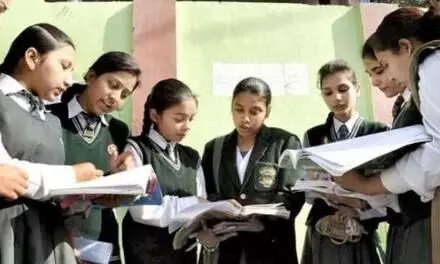
Gujarat board revises controversial para on Buddhism in Class 12 textbook
text_fieldsGandhinagar: Gujarat State Board of School Textbooks (GSBST) has directed all district education officers to ensure students are taught the revised paragraph in a Class 12 Sociology textbook instead of the “controversial” one that faced objections from Buddhists over alleged false depiction of the religion, The Indian Express reported.
The Buddhists objected what the text book reportedly claimed Buddhism is composed of two levels: upper level comprising elites and lower level comprising marginal groups. Further it said that the religion’s teacher is known as ‘Lama’ and it believes in reincarnation.
The GSBST sent along with its circular to all distract education officers the new paragraph in Gujarati, English, Hindi, Marathi and Urdu, which forms part of a chapter on “Indian Culture and Community”.
The controversial paragraph that caused protest from Buddhist groups, quoted by The Indian Express, read: “Like Sikhs, the portion of the followers of Buddhism is also meager in India. Most of them live in Maharashtra. They also reside in north-west India and in Arunachal Pradesh. Buddhism had a considerable spread in India at the time of the emperor Ashoka. Buddhism has three branches, namely, Hinyana, Mahayana and Virajyana. It has two levels. The upper level of Buddhism includes Brahmins, Kshatriyas, and certain elites, while the lower level consists of the tribals and marginal groups converted to Buddhism. Sarnath, Saanchi and Bodhigaya are important centers of Buddhism. Their religious teacher is known as Lama. Their religious places, known as Buddhist temples, have ‘wish wheel’. Tripitaka is their scripture and they believe in karma and reincarnation.”
The revised paragraph in English following the controversy attached with the circular, read: “The religion of Tathagat Buddh (a word of Dhamma-Pali language) is global. Today, followers of Buddhism in India and Gujarat are in notable number. The three important events in the life of Siddhartha Gautam Buddha, namely birth, Sambodhi (absolute knowledge) and Mahaparinirvana (someone who has attained nirvana in his lifetime and after death) happened at Lumbini, Bodhgaya and Kushinagar, respectively. Sheel (morality), Samadhi (a state of meditative consciousness) and Pragya (understanding of the true nature of phenomena) are the essence of Buddhism. Sufferings, impermanence and Anatm (non-self) are three fundamental concepts of Buddhist philosophy. Buddhism, though not believing in unchangeable and eternal soul, believes in karma and reincarnation.”
“Followers of Buddhism are considered as equals as there in no distinction of caste or class among them. The main aim of the Buddhism is to get rid of sufferings and achieve nirvana. Tripitika is the main book of Buddhism. Lumbini, Kushinagar, Shravasti, Rajgrih, Vaishali, Kousambi and Sankisa are major places of pilgrimage… ,” it added.























